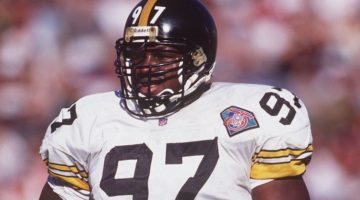Christian NFL players expressed their frustration over criticism they’ve received for anthem protest.
By ROB MAADDI
Associated Press
PHILADELPHIA — Eric Reid and other Christian players who support Colin Kaepernick’s social justice movement want believers on the opposite side of the controversial anthem protest to ask themselves a simple but powerful question:
What would Jesus do?
Reid joined Kaepernick, his former San Francisco 49ers teammate, in kneeling for the “The Star-Spangled Banner” last year because he wants to be a “voice for the voiceless,” a lesson derived from a Bible verse found in Proverbs. The 25-year-old safety-turned-linebacker said he has discussed faith with Kaepernick, who remains unsigned.
“It’s the foundation of why we started doing this,” Reid told The Associated Press on Oct. 29. “We all have a love for people. The Bible tells us love your brother as yourself so that’s why we’re doing it.
“We have to speak up for those who can’t do it for themselves. My faith is ultimately what led me to start protesting and it’s what continues to drive me. Faith without works is dead. I feel like the past year before we started protesting, the Lord has prepped me for this moment.”
Reid made the decision to kneel after a meeting with Kaepernick and former Green Beret and Seahawks long snapper Nate Boyer.
Kaepernick initially sat for the anthem before his conversation with Boyer. They chose to kneel because they felt it’s a protest “respectful gesture.”
But the movement has drawn heavy criticism as it continues to envelop the NFL. President Trump exacerbated the situation earlier this season when he suggested team owners should fire any players who knelt during the anthem.
Kaepernick, who led San Francisco to consecutive NFC championship games and one Super Bowl, filed a complaint that team owners colluded against him because of the protests, which are aimed at raising awareness for police brutality against African-Americans and other issues.
Reid said he’s “baffled” that some people misconstrue player demonstrations as being protests against the anthem itself, or the American flag, or the military or police.
He’s especially frustrated by Christians who lash out against the players.
“I do see some hypocrisy with the people that call themselves Christians,” Reid said. “If you know Jesus, he went into the house of God and turned over the tables and was angry and said they made the house of God into a marketplace so I would say this is something that He would do.”
But the issue has been so divisive that Christians can’t agree.
“This is not about black, white, brown, red or yellow; it’s about respect for the country and its flag, which symbolizes we are ‘one’ nation under God,” said Joseph Bruce Sofia, senior pastor at Gloucester County Community Church in Sewell, N.J. “The national anthem speaks of oneness and not division; it speaks of hope and unity, of poverty to wealth, from the ghetto to the presidency. The biblical principle of sowing and reaping is in effect here. Sow discord and we’ll reap discord. Oppression is a horrible thing, and needs to be taken on head-on, but take it to the town hall or courts or social media but, in my opinion, using the national anthem during a football game draws a line in the wrong sand.”
Carl Lentz, the lead pastor at New York City’s Hillsong Church, said many people, including Christians, are ignoring the real issues.
“What we see right now in culture is what’s easier? To make this about a flag, which it’s never been about, or to actually say, ‘Colin, what’s your beef? What’s your passion? What’s going on?’” Lentz said. “Our country has a sad history of missing the mark, missing the moment and deflecting issues. To judge this guy for putting his career on the line for something he’s passionate about, I do not understand. It’s sad.”
Baltimore Ravens tight end Benjamin Watson, a strong advocate for social reform, said he’s disappointed when Christians put “politics above the gospel, empathy and understanding.”
“We talk about what Jesus would do. Let’s think about that,” said Watson, who has been standing for the anthem. “How should I biblically look at this situation? Is my response as an American going against what my response should be as a Christian? If I’m a Christian, I want to delight in the things that (Christ) delights in and those things are blind. They’re not based on color, creed or culture or money,” Watson said. “Being kind is not predicated on what you can do for me. Justice is not predicated on if I experienced injustice or not. We can advocate for people who have experiences that we don’t even have. True justice is blind and righteous. Christians should be about expanding and promoting the gospel. If you listen or think about the subject matter that players and people are concerned about, you could not as someone who reads scripture turn a blind eye to it.”
Philadelphia Eagles safety Malcolm Jenkins, one of the founders of the Players Coalition, said the Christian community could effectuate positive change if it wasn’t divided. “As big as we are, as much influence as we have on policy and politics, if the church ever got behind really being for equality and really being for justice, it would show up, it would come,” said Jenkins, who has been raising a fist during the anthem. “But a lot of times we don’t show the empathy, we don’t take the time to listen and we’re just as segregated as the world is right now.”
Watson emphasized the importance of both sides listening to each other.
“These guys love America. We’re not traitors. We just want this country to be better on some things,” Watson said.
“When we’re able to sit and communicate with one another, it allows us to understand. None of us are perfect.”
Reid was one of three players who took a knee Sunday (Nov. 12) on Veterans Day weekend.
“Our protest is against systemic oppression like we always say,” Reid said. “I didn’t feel the need to stand today. I have a military background in my family. I’ve spoken to family members who don’t feel disrespected.”
AP Pro Football Writer Josh Dubow contributed.













No Comment